高一英语必修二Unit 1导学案
- 格式:doc
- 大小:20.98 KB
- 文档页数:5
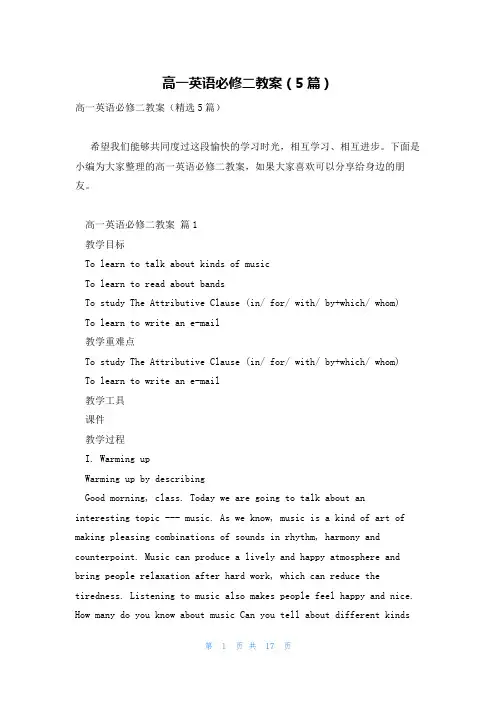
高一英语必修二教案(5篇)高一英语必修二教案(精选5篇)希望我们能够共同度过这段愉快的学习时光,相互学习、相互进步。
下面是小编为大家整理的高一英语必修二教案,如果大家喜欢可以分享给身边的朋友。
高一英语必修二教案篇1教学目标To learn to talk about kinds of musicTo learn to read about bandsTo study The Attributive Clause (in/ for/ with/ by+which/ whom) To learn to write an e-mail教学重难点To study The Attributive Clause (in/ for/ with/ by+which/ whom) To learn to write an e-mail教学工具课件教学过程I. Warming upWarming up by describingGood morning, class. Today we are going to talk about an interesting topic --- music. As we know, music is a kind of art of making pleasing combinations of sounds in rhythm, harmony and counterpoint. Music can produce a lively and happy atmosphere and bring people relaxation after hard work, which can reduce the tiredness. Listening to music also makes people feel happy and nice. How many do you know about music Can you tell about different kindsof music Now turn to page 33, look at the pictures, read the captions and listen to the different kinds of music. See if you can guess which music matches with which picture.Warming up by discussingHi, everyone. Do you like music How much do you know about music Can you tell about the different kinds of music Please turn to page 33. Look at the pictures. Let’s listen to some music. Let’s see if you can guess which music matches with which picture.Classical music Country music Rock ‘n’ RollRap Orchestra Folk musicYes, you are righ t. I’m sure you will really enjoy yourselvesafter listening to all these beautiful music. What kind of music do you like better, Chinese or Western, classical or modern Why How does music make you feel Why do you like to listen to music Let’s discuss these questions in small groups. Try to share your opinions with one another.II. Pre-reading1.Thinking and sayingHave you heard about any of the famous bands in the world List some if you can.For reference: I’ve heard about “The Beatles”, “Back Street Boys”, “The Eagles”, “West life” and “Pink Floyd”.2.Listening, talking and sharingLet’s listen to some pieces of music from different bands. Work in groups of four. Tell your group mates which band you like best. Why Then the group leader is to stand up and share the group idea with the class.For reference: I am from Group 1. Our group likes “The Beatles”best. We like their style of performances. Listening to their performances, we will feel relaxed, amused, and their performances make us think a lot about life.Do you know anything about “The Monkees”For reference: “The Monkees” is a band that was first popular in the 1960s in America. Unlike most bands of the time, the Monkees were not formed by its members but rather by TV producers. They were a fictional band in the TV show of the same name. The band was composed of Mike Nesmith, Mickey Dolenz, Davy Jones, and Peter Tork. All the members had some musical experience. Let’s come to the reading --- The Band That Wasn’t and find mo re about them.III. Reading1.Reading aloud to the recordingNow please listen and read aloud to the recording of the text THE BAND THAT WASN’T. Pay attention to the pronunciation of each word and the pauses within each sentence. I will play the tape twice and you shall read aloud twice, too.2.Reading and underliningNext you are to read and underline all the useful expressions or collocations in the passage. Copy them to your notebook after class as homework.Collocations from THE BAND T HAT WASN’Tdream of doing , at a concert , with sb. clapping and enjoying …, sing karaoke , be honest with oneself, get to form a band, high school students, practice one’s music, play to passers-by, in the subway, earn some extra money, begin as a TV s how, play jokes on…, be based loosely on…, the TV organizers, make good music, put an advertisement in a newspaper, look for rock musicians, pretend to dosth., the attractive performances, be copied by…, support them fiercely, become more serious about…, play their own instruments, produce one’s own records, start touring, break up, in the mid-1980s, a celebration of one’s time as a real band3.Reading to identify the topic sentence of each paragraphSkim the text and identify the topic sentence of each paragraph. You may find it either at the beginning, the middle or the end of the paragraph.1st paragraph: How do people get to form a band2nd paragraph: Most musicians meet and form a band.3rd paragraph: One band started as a TV show.4t h paragraph: “The Monkees” became even more popular than “The Beatles”.3.Reading and transferring informationRead the text again to complete the tables, which list how people formed a band and how The Monkees was formed by the TV organizers and became a real band.How do people get to form a bandMembers High school studentsReasons They like to write and play music.Places They practice their music in someone’s home.Forms They may play to passers-by in the street or subway.Results They can earn some extra money. They may also have a chance to dream of becoming famous.How was The Monkees formed and became a real bandThe Monkees in 1968 (left to right): Micky Dolenz, Peter Tork, Mike Nesmith Davy Jonesbeginning of the band It began as a TV show.style of the performance They played jokes on each other as well as played music.first music and jokes Most of them were based loosely on the band called “The Beatles”.development of the band They became more serious about their work and started to play their own instruments and write their own songs like a real band. They produced their own records and started touring and playing their own music.changes of the band The band broke up in about 1970, but reunitedin the mid-1980s. They produced a new record in 1996, which was a celebration of their time as a real band.4. Reading and understanding difficult sentencesAs you have read the text times, you can surely tell which sentences are difficult to understand. Now put your questions concerning the difficult points to me.IV. Closing downClosing down by doing exercisesTo end the lesson you are to do the comprehending exercises No. 1, 2, 3 and 4.Closing down by having a discussionDo you think t he TV organizers were right to call “The Monkees” a band when they did not sing or write their own songs WhyFor reference: I don’t think the TV organizers were right to call “The Monkees” a band when they did not sing or write their own songs because singing and writing its own songs was the basis of a band.Do you agree that the jokes were more important than the music for this band Give a reason.For reference: Yes. I think it is the jokes that really attract more fans.No. I think the purpose of forming a band is getting people to enjoy the spirit of music. It’s more important than playing jokes just to make people laugh.Closing down by retelling the form of the band The Monkees.I shall write some key words and expressions on the board. You are to retell the form of the band according to these words.课后小结学了这节课你有什么收获课后习题完成课后习题一、二。
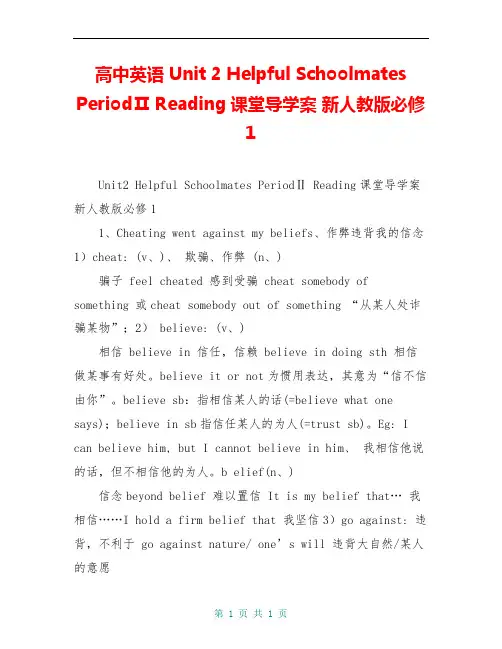
高中英语 Unit 2 Helpful Schoolmates PeriodⅡ Reading课堂导学案新人教版必修1Unit2 Helpful Schoolmates PeriodⅡ Reading课堂导学案新人教版必修11、Cheating went against my beliefs、作弊违背我的信念1)cheat: (v、)、欺骗、作弊 (n、)骗子 feel cheated 感到受骗 cheat somebody of something 或cheat somebody out o f something “从某人处诈骗某物”;2) believe: (v、)相信 believe in 信任,信赖 believe in doing sth 相信做某事有好处。
believe it or not为惯用表达,其意为“信不信由你”。
believe sb:指相信某人的话(=believe what one says);believe in sb指信任某人的为人(=trust sb)。
Eg: I can believe him, but I cannot believe in him、我相信他说的话,但不相信他的为人。
b elief(n、)信念beyond belief 难以置信It is my belief that… 我相信……I hold a firm belief that 我坚信3)go against: 违背,不利于go against nature/ one’s will 违背大自然/某人的意愿2、 I just knew I had to do what I felt was right, even if it made James mad、我只是觉得我应该做我认为正确的事,即使这样会使詹姆斯生气。
m ad: (adj、)疯狂的 =crazy go mad 发疯be mad about…对……狂热drive sb mad逼得某人发疯be mad at sb、对某人很恼火 be mad about\ on sb 迷恋某人 like mad 疯狂地3、So I guarded my paper so that he couldn’t see my answers、因此,我护着我的试卷,使他不能看到我的答案。
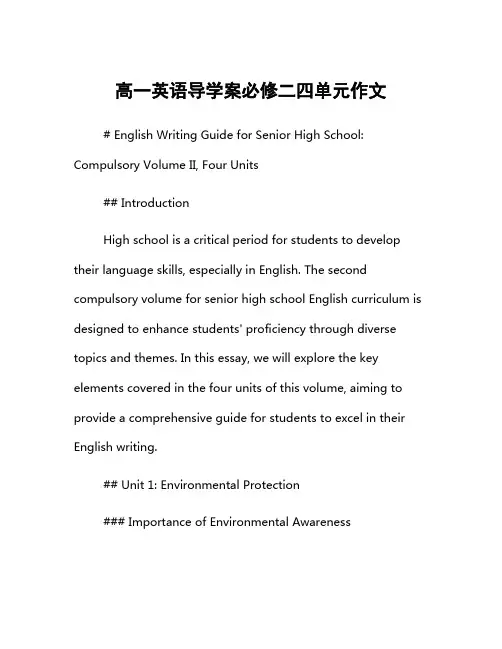
高一英语导学案必修二四单元作文# English Writing Guide for Senior High School: Compulsory Volume II, Four Units## IntroductionHigh school is a critical period for students to develop their language skills, especially in English. The second compulsory volume for senior high school English curriculum is designed to enhance students' proficiency through diverse topics and themes. In this essay, we will explore the key elements covered in the four units of this volume, aiming to provide a comprehensive guide for students to excel in their English writing.## Unit 1: Environmental Protection### Importance of Environmental AwarenessThe first unit focuses on environmental protection, emphasizing the urgent need for students to understand and engage in eco-friendly practices. Environmental awareness is not just a subject to be studied; it is a lifestyle that students need to adopt. The curriculum encourages students to explore various environmental issues, such as pollution, deforestation, and climate change, and to propose practical solutions.### Writing About Environmental IssuesWhen writing essays on environmental topics, students should begin with a clear thesis statement that outlines the specific issue they will address. For example, an essay on plastic pollution might start with: "Plastic pollution poses a significant threat to marine life and human health." The body paragraphs should provide detailed information, supported by data and examples, on the causes, effects, and possible solutions to the problem. Concluding the essay, students should restate theimportance of taking action and encourage readers to contribute to environmental conservation efforts.## Unit 2: Cultural Heritage### Understanding Cultural DiversityThe second unit delves into cultural heritage, highlighting the rich diversity of global cultures. Understanding cultural heritage is crucial for fostering mutual respect and appreciation among different communities. This unit encourages students to explore their own cultural backgrounds as well as those of others, promoting a deeper understanding of cultural identity and history.### Crafting Essays on Cultural TopicsWhen writing about cultural heritage, students should aim to present a well-rounded view of the chosen culture. This includes discussing traditions, customs, languages, and historical significance. An effective essay might start with anintroduction to the culture being discussed, followed by detailed paragraphs on various cultural aspects. For instance, an essay on Chinese cultural heritage could cover topics such as traditional festivals, cuisine, and ancient architectural styles. The conclusion should summarize the key points and reflect on the importance of preserving cultural heritage for future generations.## Unit 3: Technology and Society### Impact of TechnologyThe third unit explores the profound impact of technology on modern society. From communication to healthcare, technology has revolutionized every aspect of our lives. This unit encourages students to analyze both the positive and negative effects of technological advancements, fostering critical thinking skills.### Writing About Technological AdvancementsEssays on technology should present a balanced view, acknowledging both benefits and drawbacks. A strong essay might begin with an introduction to the chosen technological advancement, such as the internet, and its significance. The body paragraphs should delve into specific areas of impact, such as how the internet has transformed communication, education, and commerce. Additionally, students should address potential negative effects, such as privacy concerns and cybercrime. The conclusion should encapsulate the overall impact of the technology and suggest ways to maximize benefits while minimizing risks.## Unit 4: Personal Growth and Development### The Journey of Self-DiscoveryThe final unit centers on personal growth and development, guiding students through the journey of self-discovery. This unit emphasizes the importance of setting goals, overcoming challenges, and building resilience. It encouragesstudents to reflect on their experiences and aspirations, fostering a deeper understanding of themselves.### Personal Reflection EssaysWhen writing personal reflection essays, students should focus on their own experiences and how these have shaped their growth. An essay might begin with a significant personal event or challenge, followed by a detailed narrative of how the student overcame the obstacle and what they learned from the experience. For instance, an essay on personal growth could describe a time when the student had to move to a new city and adapt to a different school environment. The conclusion should reflect on how the experience contributed to the student's development and their future goals.## ConclusionIn summary, the second compulsory volume for senior high school English encompasses a wide range of topics that are essential for students' overall development. By engagingwith themes such as environmental protection, cultural heritage, technology, and personal growth, students can enhance their writing skills and broaden their perspectives. Each unit offers unique opportunities for students to explore, analyze, and reflect, ultimately helping them to become more proficient and thoughtful writers. As students navigate through these units, they should strive to articulate their thoughts clearly, support their arguments with evidence, and express their ideas with confidence and creativity.。
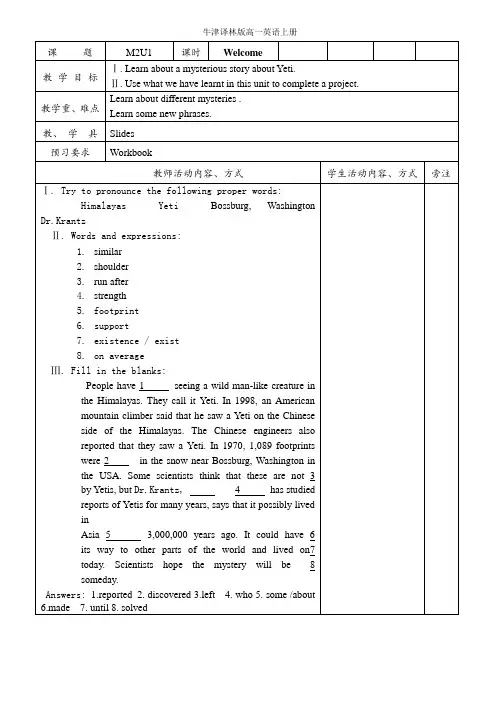
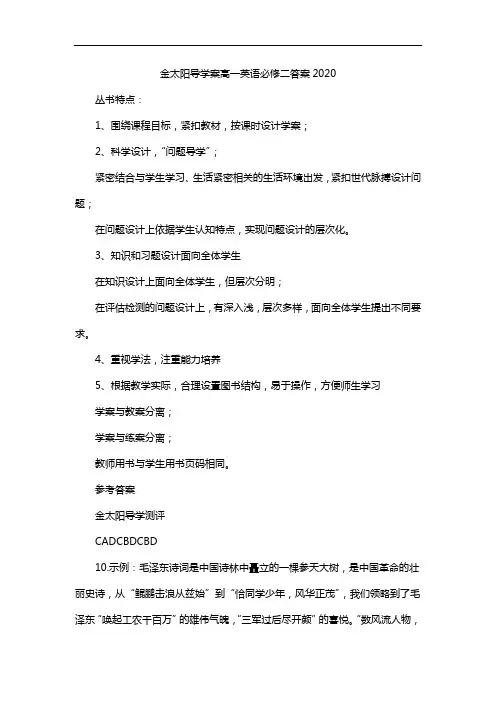
金太阳导学案高一英语必修二答案2020丛书特点:1、围绕课程目标,紧扣教材,按课时设计学案;2、科学设计,“问题导学”;紧密结合与学生学习、生活紧密相关的生活环境出发,紧扣世代脉搏设计问题;在问题设计上依据学生认知特点,实现问题设计的层次化。
3、知识和习题设计面向全体学生在知识设计上面向全体学生,但层次分明;在评估检测的问题设计上,有深入浅,层次多样,面向全体学生提出不同要求。
4、重视学法,注重能力培养5、根据教学实际,合理设置图书结构,易于操作,方便师生学习学案与教案分离;学案与练案分离;教师用书与学生用书页码相同。
参考答案金太阳导学测评CADCBDCBD10.示例:毛泽东诗词是中国诗林中矗立的一棵参天大树,是中国革命的壮丽史诗,从“鲲鹏击浪从兹始”到“恰同学少年,风华正茂”,我们领略到了毛泽东“唤起工农千百万”的雄伟气魄,“三军过后尽开颜”的喜悦。
“数风流人物,还看今朝!”同学们,让我们永远谨记一代伟人的教诲:“一万年太久,只争今朝”11.实例:长沙橘子洲头毛泽东青年雕塑揭幕。
12.实例:年轻的母亲和幼小的孩子,就像蓝天和白云一片;白云是蓝天身边的柔弱,蓝天是白云的依托;蓝天展开广阔的胸襟,孩子就找到了幸福的天堂。
金太阳导学测评DCCAB6..既控诉了敌人残暴的本性,又抒发了诗人赤诚真挚的爱国之情。
7.作者写到了家乡春天的繁花、嫩柳、荇藻、水;调动了视觉、嗅觉、触觉、使人身临其境地回到了家乡。
8.写解放区的景象的句子是“只有那辽远的一角依然完整……婴孩手中乳”。
作者抚摸到了解放区那“辽远的一角”,情绪陡然一变。
因为那里“温暖”、“明朗”、“蓬勃生春”。
“恋人的柔发”、“婴孩手中乳”,是一向为人称道的两个比喻,使人们对解放区倍感亲切。
在作者对解放区的抒情性描述中,描述的是美好、富有生机的景象,选用的词语多为积极的、暖色调的,强烈地表达了对解放区的真挚情感。
9.从词语的感情色彩上说。
写沦陷区的是消极的、冷色调的;写解放区的是积极的、暖色调的。
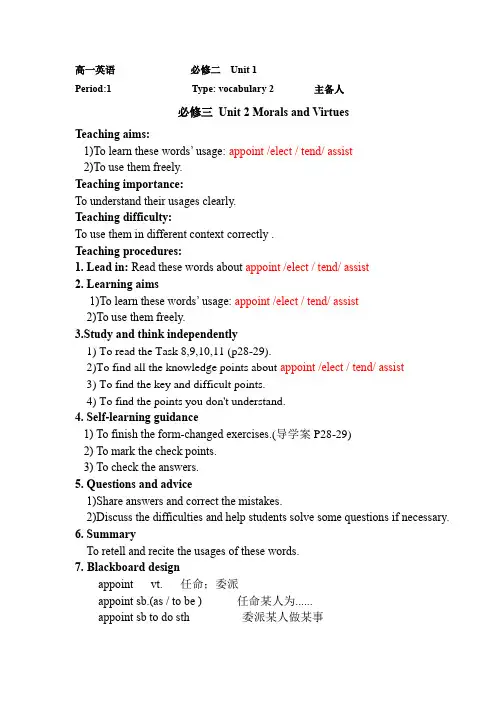
高一英语必修二Unit 1Period:1 Type: vocabulary 2 主备人必修三Unit 2 Morals and VirtuesTeaching aims:1)To learn these words’ usage: appoint /elect / tend/ assist2)To use them freely.Teaching importance:To understand their usages clearly.Teaching difficulty:To use them in different context correctly .Teaching procedures:1. Lead in: Read these words about appoint /elect / tend/ assist2. Learning aims1)To learn these words’ usage: appoint /elect / tend/ assist2)To use them freely.3.Study and think independently1) To read the Task 8,9,10,11 (p28-29).2)To find all the knowledge points about appoint /elect / tend/ assist3) To find the key and difficult points.4) To find the points you don't understand.4. Self-learning guidance1) To finish the form-changed exercises.(导学案P28-29)2) To mark the check points.3) To check the answers.5. Questions and advice1)Share answers and correct the mistakes.2)Discuss the difficulties and help students solve some questions if necessary.6. SummaryTo retell and recite the usages of these words.7.Blackboard designappoint vt. 任命;委派appoint sb.(as / to be ) 任命某人为......appoint sb to do sth 委派某人做某事elect vt. 选举;推选elect to do sth. 决定/选择做某事elect sb. to be /as... 选某人为tend vt.照顾;照料;护理vi.倾向;趋于tend to do sth. 倾向于做某事tend to sb 照看/护理某人tend to/towards sth 倾向于某事物assist vt. 帮助;协助assist sb. with sth 帮助某人某事assist sb. to do sth 帮助某人做某事8.TestRecite and check usages of the two words.9.HomeworkFinish the correction of the book by themselves.10.Teaching reflection(教学反思)高一英语必修二Unit 1 2022 Period:1 Type: vocabulary 2 主备人必修三Unit 2 Morals and VirtuesTeaching aims:1)To learn these words’ usage: appoint /elect / tend/ assist2)To use them freely.Teaching importance:To understand their usages clearly.Teaching difficulty:To use them in different context correctly .Teaching procedures:1. Lead in: Read these words about appoint /elect / tend/ assist2. Learning aims1)To learn these words’ usage: appoint /elect / tend/ assist2)To use them freely.3.Study and think independently1) To read the Task 8,9,10,11 (p28-29).2)To find all the knowledge points about appoint /elect / tend/ assist3) To find the key and difficult points.4) To find the points you don't understand.4. Self-learning guidance1) To finish the form-changed exercises.(导学案P28-29)2) To mark the check points.3) To check the answers.5. Questions and advice1)Share answers and correct the mistakes.2)Discuss the difficulties and help students solve some questions if necessary.6. SummaryTo retell and recite the usages of these words.8.Blackboard designappoint vt. 任命;委派appoint sb.(as / to be ) 任命某人为......appoint sb to do sth 委派某人做某事elect vt. 选举;推选elect to do sth. 决定/选择做某事elect sb. to be /as... 选某人为tend vt.照顾;照料;护理vi.倾向;趋于tend to do sth. 倾向于做某事tend to sb 照看/护理某人tend to/towards sth 倾向于某事物assist vt. 帮助;协助assist sb. with sth 帮助某人某事assist sb. to do sth 帮助某人做某事10.TestRecite and check usages of the two words. 11.HomeworkFinish the correction of the book by themselves.10.Teaching reflection(教学反思)。
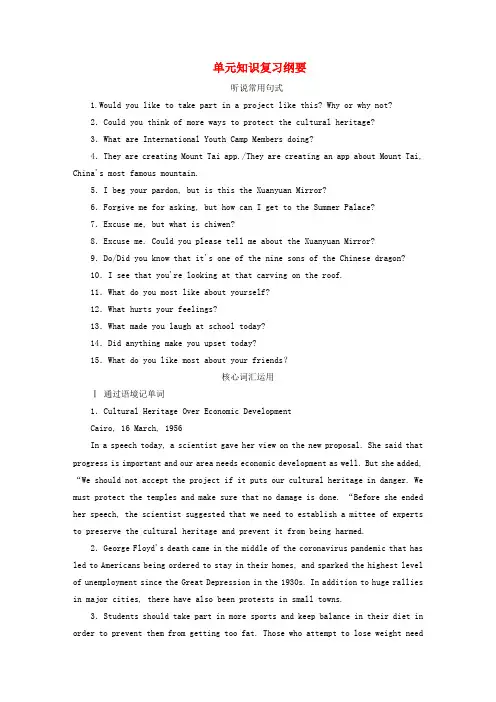
单元知识复习纲要听说常用句式1.Would you like to take part in a project like this? Why or why not?2.Could you think of more ways to protect the cultural heritage?3.What are International Youth Camp Members doing?4.They are creating Mount Tai app./They are creating an app about Mount Tai, China's most famous mountain.5.I beg your pardon, but is this the Xuanyuan Mirror?6.Forgive me for asking, but how can I get to the Summer Palace?7.Excuse me, but what is chiwen?8.Excuse me. Could you please tell me about the Xuanyuan Mirror?9.Do/Did you know that it's one of the nine sons of the Chinese dragon?10.I see that you're looking at that carving on the roof.11.What do you most like about yourself?12.What hurts your feelings?13.What made you laugh at school today?14.Did anything make you upset today?15.What do you like most about your friends?核心词汇运用Ⅰ 通过语境记单词1.Cultural Heritage Over Economic DevelopmentCairo, 16 March, 1956In a speech today, a scientist gave her view on the new proposal. She said that progress is important and our area needs economic development as well. But she added, “We should not accept the project if it puts our cultural heritage in danger. We must protect the temples and make sure that no damage is done. “Before she ended her speech, the scientist suggested that we need to establish a mittee of experts to preserve the cultural heritage and prevent it from being harmed.2.George Floyd's death came in the middle of the coronavirus pandemic that has led to Americans being ordered to stay in their homes, and sparked the highest level of unemployment since the Great Depression in the 1930s. In addition to huge rallies in major cities, there have also been protests in small towns.3.Students should take part in more sports and keep balance in their diet in order to prevent them from getting too fat. Those who attempt to lose weight needto limit their diet properly at least within a year.4.Experts investigated the issue, conducted several tests, and then made a proposal that we should build a dam across the river to make use of the water resource. Finally, a document was signed, and the work began soon.5.Many people from all over the world donated money to the project. They think they are making contributions to human development and it is worthwhile doing so. They want to make sure that the world cultural heritage or relics won't disappear so soon.6.In my opinion, during the process of learning English, quality input ensures quality output. So after listening, you need to practice speaking, and after reading, you need to practice writing. When you write, you need to quote some famous sayings to support your view. When you meet with new words, you need to turn to English dictionaries for help or ask someone overseas who are native speakers. The most important of all, you need to develop your creative thinking.7.Let's meet at the entrance to the cinema. If one of us can't arrive in time, let's meet at the exit when the film is over. Is it OK?Ⅱ 一句多译1.我相信这次会议会促进世界范围内的和平与安全。
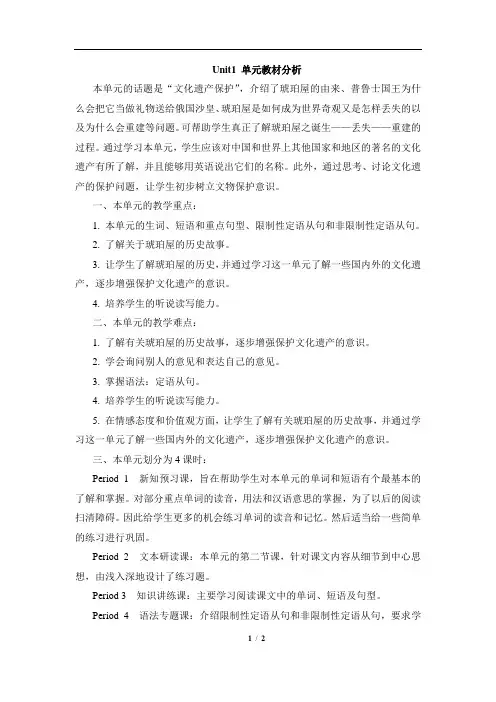
Unit1 单元教材分析本单元的话题是“文化遗产保护”,介绍了琥珀屋的由来、普鲁士国王为什么会把它当做礼物送给俄国沙皇、琥珀屋是如何成为世界奇观又是怎样丢失的以及为什么会重建等问题。
可帮助学生真正了解琥珀屋之诞生——丢失——重建的过程。
通过学习本单元,学生应该对中国和世界上其他国家和地区的著名的文化遗产有所了解,并且能够用英语说出它们的名称。
此外,通过思考、讨论文化遗产的保护问题,让学生初步树立文物保护意识。
一、本单元的教学重点:1. 本单元的生词、短语和重点句型、限制性定语从句和非限制性定语从句。
2. 了解关于琥珀屋的历史故事。
3. 让学生了解琥珀屋的历史,并通过学习这一单元了解一些国内外的文化遗产,逐步增强保护文化遗产的意识。
4. 培养学生的听说读写能力。
二、本单元的教学难点:1. 了解有关琥珀屋的历史故事,逐步增强保护文化遗产的意识。
2. 学会询问别人的意见和表达自己的意见。
3. 掌握语法:定语从句。
4. 培养学生的听说读写能力。
5. 在情感态度和价值观方面,让学生了解有关琥珀屋的历史故事,并通过学习这一单元了解一些国内外的文化遗产,逐步增强保护文化遗产的意识。
三、本单元划分为4课时:Period 1 新知预习课,旨在帮助学生对本单元的单词和短语有个最基本的了解和掌握。
对部分重点单词的读音,用法和汉语意思的掌握,为了以后的阅读扫清障碍。
因此给学生更多的机会练习单词的读音和记忆。
然后适当给一些简单的练习进行巩固。
Period 2 文本研读课:本单元的第二节课,针对课文内容从细节到中心思想,由浅入深地设计了练习题。
Period 3 知识讲练课:主要学习阅读课文中的单词、短语及句型。
Period 4 语法专题课:介绍限制性定语从句和非限制性定语从句,要求学生掌握关系代词、关系副词的正确使用。
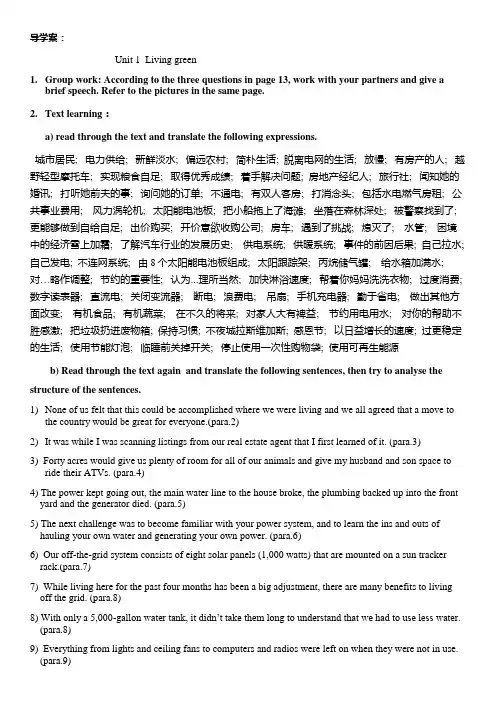
导学案:Unit 1 Living green1.Group work: According to the three questions in page 13, work with your partners and give abrief speech. Refer to the pictures in the same page.2.Text learning:a) read through the text and translate the following expressions.城市居民; 电力供给; 新鲜淡水; 偏远农村; 简朴生活; 脱离电网的生活; 放慢; 有房产的人; 越野轻型摩托车; 实现粮食自足; 取得优秀成绩; 着手解决问题; 房地产经纪人; 旅行社; 闻知她的婚讯; 打听她前夫的事; 询问她的订单; 不通电; 有双人客房; 打消念头; 包括水电燃气房租; 公共事业费用; 风力涡轮机; 太阳能电池板; 把小船拖上了海滩; 坐落在森林深处; 被警察找到了; 更能够做到自给自足; 出价购买; 开价意欲收购公司; 房车; 遇到了挑战; 熄灭了; 水管; 困境中的经济雪上加霜; 了解汽车行业的发展历史; 供电系统; 供暖系统; 事件的前因后果; 自己拉水; 自己发电; 不连网系统; 由8个太阳能电池板组成; 太阳跟踪架; 丙烷储气罐; 给水箱加满水; 对…略作调整; 节约的重要性; 认为…理所当然; 加快淋浴速度; 帮着你妈妈洗洗衣物; 过度消费; 数字读表器; 直流电; 关闭变流器; 断电; 浪费电; 吊扇; 手机充电器; 勤于省电; 做出其他方面改变; 有机食品; 有机蔬菜; 在不久的将来; 对家人大有裨益; 节约用电用水; 对你的帮助不胜感激; 把垃圾扔进废物箱; 保持习惯; 不夜城拉斯维加斯; 感恩节; 以日益增长的速度; 过更稳定的生活; 使用节能灯泡; 临睡前关掉开关; 停止使用一次性购物袋; 使用可再生能源b) Read through the text again and translate the following sentences, then try to analyse the structure of the sentences.1)None of us felt that this could be accomplished where we were living and we all agreed that a move tothe country would be great for everyone.(para.2)2)It was while I was scanning listings from our real estate agent that I first learned of it. (para.3)3) Forty acres would give us plenty of room for all of our animals and give my husband and son space toride their ATVs. (para.4)4) The power kept going out, the main water line to the house broke, the plumbing backed up into the front yard and the generator died. (para.5)5) The next challenge was to become familiar with your power system, and to learn the ins and outs of hauling your own water and generating your own power. (para.6)6) Our off-the-grid system consists of eight solar panels (1,000 watts) that are mounted on a sun tracker rack.(para.7)7) While living here for the past four months has been a big adjustment, there are many benefits to livingoff the grid. (para.8)8) With only a 5,000-gallon water tank, it didn’t take them long to understand that we had to use less water. (para.8)9) Everything from lights and ceiling fans to computers and radios were left on when they were not in use. (para.9)10) They include reducing the amount of trash we generate by recycling and composting, growing our ownorganic vegetables, and reusing and repurposing things that we would normally toss. (para.10)c) Understanding the Text:Text Organization (page 17)3.Finish the exercises from page 18 to 25 and they will be checked in class.4.Understand reading 1 & reading 2 and translate the following sentences.a) Reading 1:1) We were excited about the 5-week lifestyle experiment of living without a car in the suburbs of a major world city (Sydney, Australia), and getting the chance to better align our own actions with our values related to sustainability and health.2) Unfortunately, trains could only partly replace our car as the nearest station to our suburban household was morethan 3 miles away.3) Much of the way, there were bike lanes available, albeit lanes that were often full of debris or other obstacles.4) The good aspects of living without a car included having no car maintenance or car insurance, and not having to worry about break-ins, theft, or crashes.5) There were safety concerns with regard to cycling in traffic, being in strange train stations, and waiting at bus stops.6) We intend to continue our family’s efforts to live more sustainabl y, while simultaneously advocating for more supportive policies to reduce dependence on automobiles through initiatives such as additional bike lanes, walking paths, and better public transportation options.b) Reading 2:1) With nearly 4,000 Chinese companies manufacturing these devices, this relatively simple low-cost technology has leapfrogged into villages that do not yet have electricity.2) This technology is sweeping China like wildfire, already approaching market saturation in some communities.3) What is confusing is that while China has found a way to have an affordable price for these units and make them commonplace in China, it’s very rare to see a unit like this in America.4) Many of the residents there live in smaller city apartments and the idea of “suburbs” don’t exist. In addition, in the U.S. typically people have water tanks in their basements or garages instead of having a storage tank on the roof.5. Finish integrated skills practicing from page 32 to 35.。
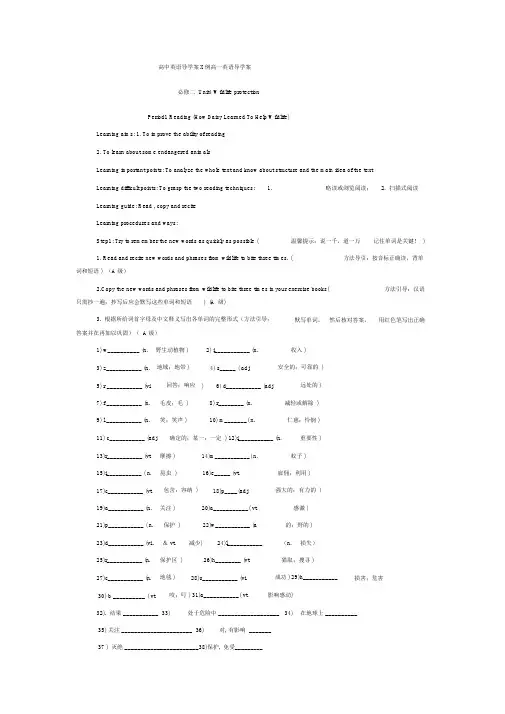
高中英语导学案X例高一英语导学案必修二 Unit4 Wildlife protectionPeriod1 Reading (How Daisy Learned To Help Wildlife)Learning aims: 1. To improve the ability of reading2. To learn about some endangered animalsLearning important points: To analyze the whole text and know about structure and the main idea of the textLearning difficult points: To grasp the two reading techniques: 1.略读或浏览阅读; 2. 扫描式阅读Learning guide: Read , copy and reciteLearning procedures and ways:Step1: Try to remember the new words as quickly as possible (温馨提示:说一千,道一万记住单词是关键! )1. Read and recite new words and phrases from wildlife to bite three times. (方法导引:按音标正确读,背单词和短语 ) (A 级)2.Copy the new words and phrases from wildlife to bite three times in your exercise books(方法引导:汉语只需抄一遍;抄写后应会默写这些单词和短语)(A 级)3. 根据所给词首字母及中文释义写出各单词的完整形式(方法引导:默写单词,然后核对答案,用红色笔写出正确答案并在再加以巩固)( A 级)1) w__________ (n.野生动植物 )2) i___________ (n.收入 )3) z___________ (n.地域;地带 )4) s_____ ( adj.安全的;可靠的 )5) r ___________ (vi.回答;响应)6) d___________ (adj.远处的 )7) f ___________ (n.毛皮;毛 )8) r________ (n.减轻或解除 )9) l ___________ (n.笑;笑声 )10) m_______( n.仁慈;怜悯 )11) c___________ (adj.确定的;某一;一定 ) 12)i___________ (n.重要性 )13)r___________ (vt摩擦 )14)m___________( n.蚊子 )15)i___________ ( n.昆虫 )16)e_____ (vt.雇佣;利用 )17)c___________ (vt.包含;容纳 )18)p____(adj.强大的;有力的 )19)a___________ (n.关注 )20)a___________( vt.感激 )21)p___________ ( n.保护 )22)w___________ (a的;野的 )23)d___________ (vi .& vt.减少)24)l___________(n.损失)25)r___________ (n.保护区 )26)h________ (vt.猎取;搜寻 )27)c___________ (n.地毯 )28)s___________ (vi.成功 ) 29)h___________损害;危害30) b __________ ( vt.咬;叮 ) 31)a___________( vt.影响感动)32). 结果 ___________ 33)处于危险中 ___________________ 34)在地球上 __________35) 关注 ______________________ 36)对, 有影响 _______37 ) 灭绝 _______________________38)保护,免受_________39) 保护区_______________40)平静地_______________Step2:Look through the text HOW DAISY LEARNED TO HELP WILDLIFE and get the main idea of it. (方法引导:略读或浏览阅读,忽略不懂的句子和生词,快速阅读课文。
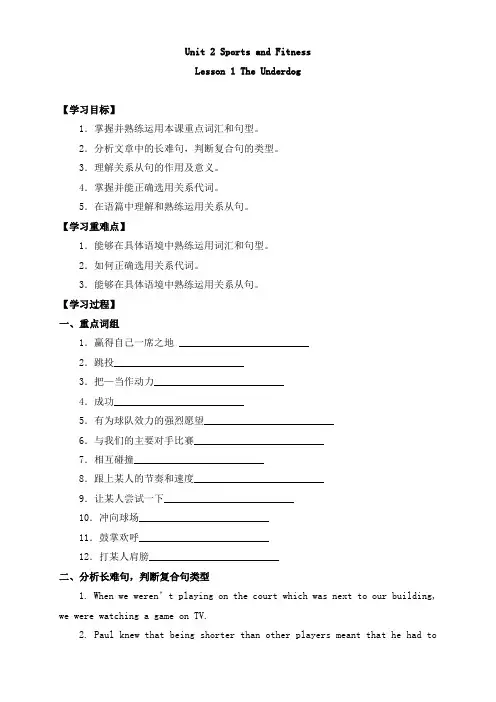
Unit 2 Sports and FitnessLesson 1 The Underdog【学习目标】1.掌握并熟练运用本课重点词汇和句型。
2.分析文章中的长难句,判断复合句的类型。
3.理解关系从句的作用及意义。
4.掌握并能正确选用关系代词。
5.在语篇中理解和熟练运用关系从句。
【学习重难点】1.能够在具体语境中熟练运用词汇和句型。
2.如何正确选用关系代词。
3.能够在具体语境中熟练运用关系从句。
【学习过程】一、重点词组1.赢得自己一席之地 __________________________2.跳投__________________________3.把—当作动力__________________________4.成功__________________________5.有为球队效力的强烈愿望__________________________6.与我们的主要对手比赛__________________________7.相互碰撞__________________________8.跟上某人的节奏和速度__________________________9.让某人尝试一下__________________________10.冲向球场__________________________11.鼓掌欢呼__________________________12.打某人肩膀__________________________二、分析长难句,判断复合句类型1. When we weren’t playing on the court which was next to our building, we were watching a game on TV.2. Paul knew that being shorter than other players meant that he had topractise more.3. Paul’s favourite player was Tyrone Bogues, a guy who played for the Charlotte Hornets, although we actually agree that they are both champions.4. The Lions were playing our main competitors, The Bears, a team whose record this season had been perfect.5. He didn’t know he’d soon get the chance that he’d been waiting for.6. Everyone knew Paul had real skills, and was someone who worked really hard and had a strong desire to play for the team.7. And clearly, all the extra hours that he’d spent practising alone paid off.8. He was still usually on the bench, being just a replacement, which was really tough on him.9. Bogues was only 1.6 metres tall, which made him the shortest player ever in the NBA.三、重点词汇ever mean try out compete be tough on pay off1. ever 曾经;(与比较级连用,置于than之后或与最高级连用)比以往任何时候Have you ever visited the great wall?It’s raining harder than ever. 雨下得更大了the shortest player ever in the NBAThis is the best work that you have ever done.=This is your best work ever. 这是你所的最好的工作。
高一英语必修二参考答案Unit 1: Festivals Around the WorldVocabulary Practice:1. The celebration of the Spring Festival is the most important event in Chinese culture.2. People gather to enjoy the parade and fireworks during the festival.3. The tradition of eating mooncakes is associated with the Mid-Autumn Festival.4. The origin of Halloween dates back to ancient Celtic festivals.5. Customs vary from place to place, but the spirit of the festival remains the same.Grammar Focus:- The present perfect tense is used to describe actions that have occurred in the past but are connected to the present. - The present perfect continuous tense indicates an action that started in the past and is still continuing.Reading Comprehension:1. The text mainly discusses various festivals celebrated around the world.2. The Spring Festival is a time for family reunion in China.3. Halloween is celebrated by dressing up in costumes and trick-or-treating.4. The Lohri festival is a harvest festival in India.5. The text suggests that festivals are a way to bring people together and celebrate cultural diversity.Language Points:- "Celebrate" is used to describe the act of honoring or commemorating an event.- "Gather" means to come together in one place.- "Parade" refers to a public procession celebrating a special event.- "Custom" is a traditional way of behaving in a particular society.Unit 2: English Around the WorldVocabulary Practice:1. English has become a global language, widely used in business and communication.2. The influence of English is evident in many countries around the world.3. Standard English is the form of the language used in formal settings.4. Variations of English can be found in different regions and cultures.5. Learning English as a second language can open up many opportunities.Grammar Focus:- The simple past tense is used to describe completed actions or events in the past.- The past continuous tense describes an action that was happening at a specific time in the past.Reading Comprehension:1. English is the most widely spoken language in the world.2. The text discusses the spread of English and its status in various countries.3. English is used as a second language in many countries, including India and Nigeria.4. The text highlights the importance of English in international communication and business.Language Points:- "Global" means worldwide or affecting the whole world.- "Influence" refers to the effect or impact something has on someone or something.- "Standard" indicates a level of quality or attainment.- "Variation" is a change or difference in the form of something.Unit 3: Travel JournalVocabulary Practice:1. Travelers often keep a journal to record their experiences.2. The scenery along the way was breathtaking.3. They explored the ancient ruins and learned about the history of the place.4. The local food was a delightful surprise.5. The culture of the place left a deep impression on them.Grammar Focus:- The past perfect tense is used to describe an action that was completed before another past action.- The "if only" structure is used to express regret or a wish for something that did not happen.Reading Comprehension:1. The text is a travel journal entry describing a trip to a historical site.2. The author describes the beautiful scenery and the experience of exploring the ruins.3. Trying local food and learning about the culture were highlights of the trip.4. The author expresses a wish to return and explore more of the area.Language Points:- "Journal" is a daily record of events or observations.- "Scenery" refers to the natural features of a landscape.- "Explore" means to travel in or through an area in order to learn about or familiarize oneself with it.- "Local" pertains to a particular area or neighborhood.- "Culture" encompasses the beliefs, customs, arts, etc., of a particular society or social group.Unit 4: EarthquakesVocabulary Practice:1. Earthquakes are natural disasters that can cause significant damage.2. The epicenter is the point on the Earth's surface directly above the focus of an earthquake.3. Aftershocks are smaller earthquakes that follow the main shock.4. Preparedness is the state of being ready for a possible event.5. Rescue efforts are made to save people from dangerous situations.Grammar Focus:- The passive voice is used to emphasize the action or the receiver of the action rather than the do。
第一课时Section A 1a-2d【课时重点】一、词汇1. work with friends 和朋友一起合作2. work with a group 小组合作3. make word cards制作单词卡片4. listen to the tap 听磁带5. ask sb. for help 向某人求助6. study for a test 为考试学习7. have conversations with sb. 和某人对话8. read aloud 大声朗读9. give a report 作报告10. learn a lot 学到很多11. a very slow reader 一个读书很慢的人12. get the main ideas 抓住主要意思13. that way =in that way 通过那种方式14. word by word 一词一个词15. be patient with sb. 对某人有耐心16. finish reading a book看完书二、句子1. --- How do you study for a test? 你怎样为考试而学习?--- I study by working with a group . 我通过小组合作来学习。
2. The more you read , the faster you’ll be . 你读得越多,你就读得越快。
3. You can become better by reading something you enjoy every day .你通过每天读一些拟喜欢的东西而变得更好。
4. It’s too hard to understand spoken English . 听懂英语口语太难了。
5. It takes time。
慢慢来。
别着急。
【合作探究】1. 表方式的by 。
by + doing 通过……方式如:by studying with a group2. ―大声地‖之意的aloud、loud、loudly① aloud,副词,出声能让人听见, 但声音不一定很大,,无比较级和最高级。
高一英语必修二Unit 1导学案学习目标1能够熟读课文并背会部分段落。
2掌握本单元重点词和短语的用法。
学习方法1在理解的基础上记忆并运用本单元重点词汇。
预习案一.单词拼写。
根据读音、词性和词义写出下列单词。
1.__________ adj. 有价值的2.__________ vi. 幸免3.__________ n. 朝代4.__________ vt. 惊讶5.__________ vt. 挑选6.__________ n. 蜂蜜7.__________ n. 设计8.__________ adj. 奇特9.__________ n. 风格 10.__________ v. 装饰11.__________ n. 珠宝 12.__________ vi. 属于 13.__________ n. 接待 14.__________ vt. 移动 15.__________ n. 怀疑,16.__________ adj. 值得的 17.__________ n. 证据18.__________ vi 爆炸 19.__________ vi. 下沉 20.__________ n. 争论写出下列短语的意思 1. in search of ___________ 2. belong to _____________ 3. at war ________ _______ 4. in return_____________ 5. less than ______________ 6. take partin____________ 7. think highly of _______________ 8. pay much attention to __________ 9. rather than ______________ 10. there is no doubt that_________探究案1、In search of the amber room 寻找琥珀屋 search vt. 搜查 We searched the whole town, but could not find one flower shop. 我们找遍了整个城镇,但没找到一家花店。
(1)search for 寻找What are you searching for? money? 你在找什么?钱吗? 2)in search of 找寻 The man walked through the streets in search of his lost bike. 那个人在好多条街道转寻找他丢失的自行车。
即时活用: 1)She tried ____ but failed; now she could do nothing but wait till her husband came. A. to search the pockets her key B. searching her keys for her pockets C. searching the pockets for her keys D. to search her keys for the pockets2、This gift was the Amber Room, which was given this name becauseseveral tons of amber were used to make it. 这个礼物就是琥珀屋,起这个名字是因为做它用了好几吨的琥珀。
be used to do sth. 被用于 Wood is used to build houses. 木头被用于建房子。
be used to do sth.还有一个同义句型be used for… Wood is used for building. 木头被用于建筑。
拓展。
(1)used to do sth. 过去(常常)做某事 The old man used to tell stories to children. 那个老人过去常给孩子们讲故事。
提示。
A. used to do sth. “过去(常常)做某事”句型暗示“现在不再做了”。
B. 这个句型的否定形式有两种。
The old man used not to tell stories to children. 那个老人过去不给孩子们讲故事。
The old man didn’t use to tell stories to children. 那个老人过去不给孩子们讲故事。
(2)be / get used to sth. / doing sth. 习惯于做某事 I have got used to getting up early in the morning. 我已经习惯于早上早起了。
练习 1)、After half a year’s training, they were made entirely used _______underwater. A.to stay B.to staying C.staying D.stay 2)、The key you have just got ____ the front door. A. is used to opening B. is used to be opened C. is used to open3)、The experienced driver has got ______ in all kinds of weather.A. used to driveB. use d to drivingC. use to driveD. use to driving 3The amber which was selected had a beautifulyellow-brown color like honey.被挑选的琥珀有着像蜂蜜一样漂亮的黄棕色。
辨析;select; choose; elect; pick out 挑选;选择1)select 在同类的许多东西中,进行有斟酌的精选。
强调以客观为标准进行选择。
强调从许多不同种类中进行强调从许多不同种类中进行选择时的挑剔态度。
The woman selected the best tings from the shop. 那位妇女挑选了商店里最好的东西。
2)choose 侧重于凭个人意愿或判断力在一些人、物或行为方式中选出一个的意思。
Finally I chose the job that the company offered. 最后我选择了公司提供给我的工作。
3)elect 指选举或用其他方法推选人,有时也可治“决定”。
这种选择通常指通过深思熟虑。
All the people agreed to elect me their chairman. 所有人都同意选我当主席。
4)pickout 指从个人角度在众多中进行挑选,常用于经过对比就能做出决定的场合。
Will you help me pick out the good apples? 能帮我把好苹果挑出来吗?练习1)、This picture was taken a long time ago. I wonder if you can ____ my father. A. find out B. pick out C. look out D. speak out 2)、----- Have you ______ what y ou want to eat? -----Not yet . A. chosen B. elected C. selected D. picked out 4、However, the next King of Prussia, Frederick William I, to whom the amber room belonged, decided not to keep it.然而,下一位普鲁士国王,腓特烈.威廉一世,这个琥珀屋的主人却决定不要它了。
belong to不用进行时态和被动式。
1)、The ship ----- the American company by the rainstorm. A.belonged to, was destroyed B.which was belonged to, destroyed C.belonging to, destroyed D.which belonged to, was destroyed 2、This 486 computer used to to my cousin. A.be belonged B.be belonging C.belonging D.belong 5、In return, the Czar sent him a troop of his of his best soldiers.作为回报,沙皇送了他一支最好的军队。
in return作为报答;回报 I wish I could do something for you in return. 我希望我能做点什么来报答你。
6、Sadly, although the Amber Room was considered one of the wonders of the world, it is now missing. 虽然琥珀屋被看作世界上的奇迹之一,但悲伤的是,现在它丢了。
consider 用法归纳:(1)考虑A. +名词 You should consider the matter carefully. 你应该认真考虑一下这个问题。
B. +连接代词或连接副词+to do We haven’t considered when to start. 我们还没有考虑什么时候开始。
C. +连接代词或连接副词引导的从句 Have you considered what course you will take when you are in college? 你考虑没有到大学后学什么专业? D. + 动名词 I am considering giving up smoking. 我在考虑戒烟。
特别提示:1、consider当“考虑”讲时,多考其后跟doing的用法。
2、consider当“考虑”讲时,其后一般不跟that引导的从句。
(2)认为A. + that 从句 We all consider that the educational reform in China is necessary. 我们都认为中国的教改是必要的。